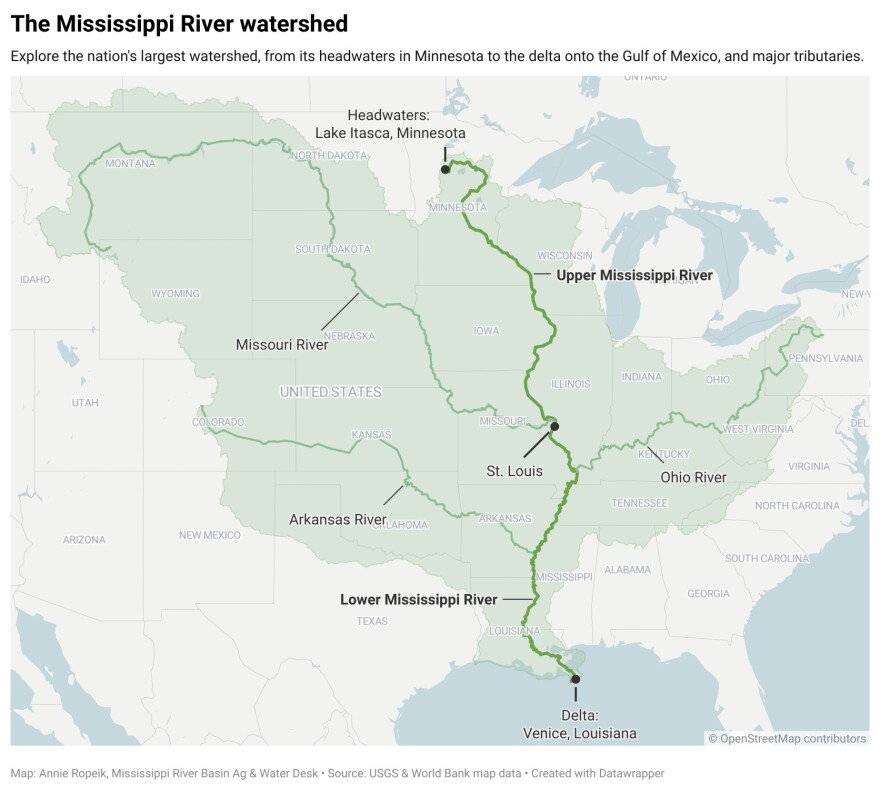A new survey finds that Latino voters who live near the Mississippi River value the river and are worried about pollution.
The poll by the Hispanic Access Foundation, an advocacy group, shows that this community cares deeply about the environment and advocating for policy changes.
The results showed that Latino voters who live in states that border the Mississippi River enjoy the river; 63% said they do activities on or by the river, and 51% value the benefits to their mental health.
The Latino voters in this study lived in counties adjacent to the river in all ten states along the Mississippi River; Arkansas, Illinois, Iowa, Kentucky, Louisiana, Minnesota, Mississippi, Missouri, Tennessee, and Wisconsin.
Ninety-one percent said they support potential congressional policies to create new national parks, monuments, or wildlife refuges to protect areas for outdoor recreation. Eighty-three percent described the Mississippi River as a national treasure and 52% said they felt responsible for it.
The study only included registered voters, which would not necessarily include undocumented residents, who also make up some of the Latino population in the basin.
“I think that's something of a big piece of a voice that we're missing,” said Magali Rojas, an environmental justice advocate in Kansas City. “So it's bigger than what we know, and it's more important than what we realize.”

Advocates say the findings are important because Mississippi River communities face unique challenges, such as impaired water quality and invasive species. The authors hope the findings help communities advocate for their needs and demonstrate to decision-makers that they care about the environmental impacts on their communities.
“We wanted to highlight Latino perspectives,” said Vanessa Muñoz, the Hispanic Access Foundation’s waterways manager. “Oftentimes we're left out of conversations when it comes to policy changes.”
Muñoz says the findings illustrate the power Latino voters in the region could hold in the upcoming presidential election. Fifty percent said their states were on the wrong track. Forty five percent said they favored presidential candidate Donald Trump, while 34% favored Kamala Harris.
When it came to policy issues, 56% said taking action to restore the Mississippi River should be a high priority for their state.
The results concluded that Latino voters in the region prefer members of Congress who ensure the protection of public lands even at the expense of oil and gas production. Seventy-four percent of Latinos surveyed support the international effort called “30x30,” which sets a goal of conserving 30% of land and waters by 2030. The Biden administration has committed to the effort.
Seventy-four percent of respondents were also concerned about pollution in rivers, lakes and streams. Worries about microplastics, trash, chemical waste and PFAS, or “forever chemicals,” in the Mississippi River, registered even more concern. Eighty-six percent felt PFAS are a significant threat to the Mississippi River.

“The poll taught us that the Latino vote is growing. Because of this, we see a concern for conservation in the Latino communities, whether because of environmental justice, a spiritual connection, or something that just relates to them due to health impacts,” Rojas said.
Muñoz added that conservation initiatives should take note of the findings, saying they “would have far better results if they made a greater effort to engage and help remove the barriers that impede Latinos from joining and becoming passionate river advocates.”
The findings reflect those of a similar survey of the general population in the same ten Mississippi River basin states, conducted last year by the University of Missouri in partnership with the Mississippi River Basin Ag & Water Desk. The majority of people surveyed in that study were concerned about environmental issues, extreme weather, pollution and land development in the watershed.
The Latino-focused survey data is available in English and Spanish.
This story is a product of the Mississippi River Basin Ag & Water Desk, an independent reporting network based at the University of Missouri in partnership with Report for America, with major funding from the Walton Family Foundation. The Hispanic Access Foundation and their Latino survey they conducted are also funded by Walton.


